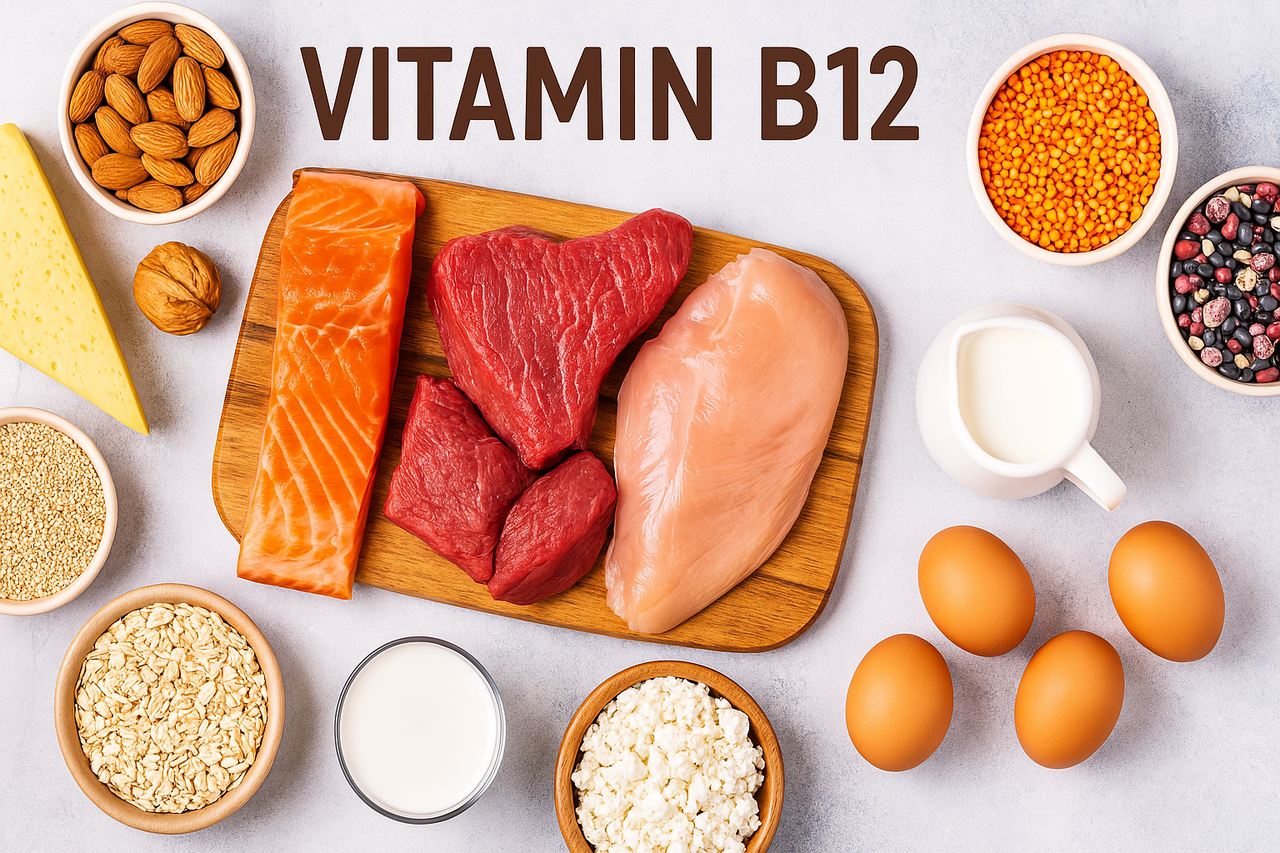
If you’re feeling constantly exhausted or weak, your body might be trying to tell you something important: it could be a sign that you're lacking vitamin B12. This essential nutrient plays a critical role in red blood cell production, maintaining a healthy nervous system, and supporting DNA synthesis. Without enough B12, you could be at risk for anemia and nerve-related issues, which can seriously impact your overall health.
Understanding vitamin B12
Vitamin B12 is extremely vital for your health. It helps your nerves function properly, produces DNA, and generates red blood cells. A shortage of B12 can produce a kind of anemia in which red blood cells grow excessively large and are unable to carry oxygen effectively, leaving you feeling weak and exhausted. This vitamin is mostly present in animal-based and fatty meals, thus it is critical to consume the appropriate foods to ensure adequate intake. Getting adequate B12 keeps your body robust and avoids fatigue from anemia.
Why is Vitamin B12 Important?
Our bodies require several vitamins and minerals to remain strong and healthy. Vitamin B12, often known as cobalamin, is an extremely important vitamin. It promotes the production of red blood cells, which transport oxygen throughout the body. It also contributes to the health of the brain and nerves, as well as the production of DNA and RNA, which are required for cell growth. Because vitamin B12 is water-soluble, our bodies can readily absorb it, but they cannot create it on their own. This implies we must receive it from the food we consume.
Vitamin B12 is mostly found in animal foods such as meat, poultry, fish, eggs, and dairy products. Vegans and vegetarians may struggle to acquire adequate B12 since they do not consume animal products. They can acquire it via fortified foods, such as some cereals, plant-based milk, and nutritious yeast. A deficiency of vitamin B12 can lead to major health concerns such as anemia, heart disease, nerve damage, and memory loss.
Other signs of B12 deficiency include dizziness, exhaustion, pale skin, weakness, mood swings, and headaches. Older folks, vegans, vegetarians, and people with digestive issues (such as Crohn's disease or celiac disease) are more likely to be B12 deficient. To keep healthy and avoid B12 deficiency, consume foods high in vitamin B12. Supplements can also be used to maintain healthy levels if necessary. Here are some items you should incorporate into your diet to ensure you receive enough vitamin B12:
1. Eggs: Eggs are a simple and inexpensive approach to enhance your vitamin B12 levels. The yolk contains the majority of the B12; thus, eating entire eggs ensures that you get the maximum benefit. Eggs are high in vitamin B12, as well as protein, healthy fats, and other essential vitamins, such as D and B6. They are an excellent complement to any meal and may be prepared in a variety of ways, including boiled, scrambled, and fried.
Eating one egg each day might naturally boost your B12 levels. The quantity of B12 in an egg varies with its size, but a big egg contains around 0.6 mcg of vitamin B12. Because the recommended daily intake for most persons is 2.4 mcg, one big egg meets approximately 25% of your daily requirements.
In addition to B12, eggs promote muscular growth, cognitive function, and eye health. They also keep you fuller for longer, making them an excellent snack for weight management. Because eggs are so healthy and easy to cook, incorporating them into your diet is a simple method to improve overall health.
2. Tuna: Tuna fish is easily found on the market. It has a lot of protein, vitamins, and minerals, making it both healthful and popular. The muscles beneath its skin contain a lot of vitamin B12 (cobalamin), which helps keep your body robust.
Tuna provides numerous vital nutrients, whether eaten fresh or tinned. It also contains omega-3 fatty acids, which are beneficial to the heart and brain. Eating tuna can boost your energy levels, promote muscular growth, and keep your skin and hair healthy. Because it is low in fat and high in protein, it is an excellent choice for a healthy diet.
3. Milk: Milk is a popular and healthful beverage that contains a significant quantity of vitamin B12. Drinking a glass of milk every day will help you satisfy your body's requirements for this essential vitamin. Vitamin B12 is necessary for the formation of red blood cells, the health of neurons, and the production of energy.
Cow's milk contains naturally occurring vitamin B12. A cup of cow's milk typically includes 1.2 to 1.4 mcg of vitamin B12, which meets a significant percentage of your daily needs. If you do not consume cow's milk, you can substitute plant-based milk such as almond, soy, or oat milk. Many of them are fortified with vitamin B12, however the amount varies by brand. Always check the label to ensure you're receiving enough.
Milk is also high in calcium, protein, and other minerals that assist maintain bone, tooth, and muscle strength. Including milk in your regular diet is a simple approach to keep healthy and avoid vitamin B12 deficiencies. If you are lactose intolerant, you can use lactose-free milk, which has the same amount of B12.
4. Cheese: Cheese, such as Swiss and mozzarella, is a simple and delicious method to receive vitamin B12. It may be added to sandwiches, pizzas, and salads, or just enjoyed as a cheesy snack. Furthermore, it promotes strong bones and muscles.
5. Mushrooms: Some mushrooms, such as shiitake, contain modest levels of vitamin B12. Despite their lack in quantity, they are extremely nutritious, containing vitamins, fiber, and antioxidants in plenty. Add them to soups, stir-fries, or omelets for added nutrition!
6. Animal Liver: Liver (like beef or chicken liver) is an excellent source of vitamin B12. Just a single piece provides more than enough B12 for the day! It also contains iron and vitamin A, which promote vitality and clear vision. Not a fan of the flavor? Try adding it to stews or curries!
Vitamin B12-Rich Vegetarian Foods
Vitamin B12 is necessary for energy, red blood cell formation, and neuron function. Because it is mostly found in animal products, vegetarians must seek other sources.
Fortified plant-based milks, such as soy, almond, and oat milk, are excellent sources of vitamin B12. Fortified cereals are also a convenient breakfast alternative that include this essential ingredient. Nutritional yeast, a popular vegan ingredient, has a cheesy flavor and is sometimes supplemented with vitamin B12, making it an excellent addition to salads, pasta, and soups.
Certain mushrooms, such as shiitake, contain trace quantities of B12, although they should be supplemented with other sources. Lacto-ovo vegetarians may acquire enough nutrients from dairy products, including cheese, yogurt, and eggs. Fermented foods like tempeh and miso may contain trace amounts of B12.
Because plant-based sources of B12 are limited, vegetarians and vegans often rely on supplements. Including a variety of these items in your diet will help you maintain healthy B12 levels and feel stimulated.
Conclusion
Vitamin B12 is vital for energy production, red blood cell formation, and nerve function. A deficiency can lead to anemia, fatigue, and neurological issues. Since animal products are the main source, vegetarians can opt for fortified plant-based foods like milk, cereals, and nutritional yeast. Supplements may also be necessary for those on plant-based diets.

















